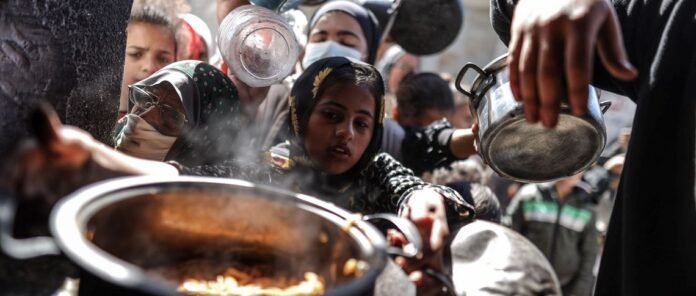Understanding the Crisis of Food Insecurity in Conflict Zones
Food insecurity has emerged as a critical humanitarian concern, particularly within conflict zones, where the interplay between violence and hunger exacerbates the suffering of vulnerable populations. The prevalence of food insecurity in these regions is not merely a statistic; it reflects a complex crisis driven primarily by armed conflict. According to the United Nations, over 200 million individuals are estimated to face acute food insecurity due to conflicts, with countries such as Sudan, Yemen, and Gaza serving as stark examples.
In Sudan, prolonged civil war and instability have resulted in significant agricultural decline, crippling food production systems that communities once relied upon. The combination of displacement, restricted access to land, and the destruction of infrastructure has intensified a cycle of poverty and hunger. In Yemen, the ongoing conflict has triggered one of the world’s greatest humanitarian crises, with a staggering 16 million people facing severe food shortages. The blockade of essential goods and the destruction of economic viability have made it nearly impossible for many to access adequate nutrition.
Similarly, in Gaza, the conflict has led to significant economic distress, which, coupled with movement restrictions and limited access to resources, has created a severe food deficit impacting daily life. As noted by Amina Mohammed, Deputy Secretary-General of the United Nations, the intertwined nature of war and famine is evident. She emphasizes that “conflict creates hunger, and hunger fuels conflict,” underscoring the cyclical relationship that perpetuates suffering in these regions.
Addressing conflict-related food insecurity requires an urgent and nuanced understanding of these dynamics. Collaboration among governments, NGOs, and international bodies is essential to not only provide immediate assistance but also develop sustainable solutions to break the cycle of hunger and violence. The intersection of conflict and food insecurity must therefore be a key focus of humanitarian efforts moving forward.
The Role of International Bodies in Combating Hunger
International bodies play a critical role in addressing conflict-related food insecurity, particularly in regions plagued by war and violence. The recent Security Council debate underscored the urgent need for a concerted global approach to combat hunger exacerbated by armed conflict. Nations represented at this debate highlighted the importance of full implementation of existing resolutions that tackle starvation as a weapon of war. This emphasis points to a broader recognition of the humanitarian crises stemming from the intentional withholding of food aid and resources in conflict zones.
The United Nations, alongside various international organizations, has reiterated the necessity for accountability for those who deliberately use starvation as a method of warfare. Numerous delegations advocated for resolutions that would not only condemn such actions but also establish a framework for sanctioning those who violate international humanitarian law. These sanctions aim to deter violators by imposing financial penalties and restricting access to essential resources, thereby highlighting starvation as a serious breach of human rights.
Furthermore, discussions during the Security Council meeting gave rise to recommendations that focus on enhancing cooperation among member states to address logistical challenges in delivering humanitarian assistance. Ensuring that aid can reach the most affected populations is paramount in alleviating hunger and preventing further deterioration of living conditions. International bodies are encouraged to streamline processes for food distribution, prioritize the protection of humanitarian workers, and safeguard access to essential services.
As calls for action continue to resonate, the need for a unified response to combat food insecurity cannot be overstated. International organizations, in partnership with member states, have the responsibility to not only address immediate hunger crises but also to establish sustainable solutions that prevent future occurrences of starvation as a weapon in conflict settings.
Strategies for Preventing Famine and Protecting Food Systems
Preventing famine in conflict-affected regions requires a multi-faceted approach that emphasizes collaboration among various stakeholders, including governments, international organizations, and local communities. Coordinated efforts among nations are essential to effectively address the disruptions in food systems caused by conflict. These efforts can take many forms, such as establishing international frameworks to share resources, knowledge, and technology that bolster food security initiatives.
Utilizing data and reporting systems is critical to identifying early warning signs of food insecurity. By employing comprehensive monitoring systems, stakeholders can obtain real-time insights into food availability, price fluctuations, and crop yields. This proactive stance allows for timely interventions, such as the distribution of food aid or the implementation of agricultural programs that focus on sustainability. Early warning systems can also inform policy decisions, enabling governments to respond more effectively to emerging crises.
Local communities, particularly women and youth, should be deeply involved in developing and implementing agricultural solutions tailored to their unique contexts. The inclusion of these groups not only enhances local ownership of food security initiatives but also equips the community with the necessary skills and knowledge to adapt to changing circumstances. Encouraging the participation of women can also lead to better decision-making and utilization of resources, as women often play a vital role in agricultural production and food distribution.
Sustainable practices must be at the forefront of food production efforts in conflict-impacted areas. The adoption of innovative agricultural techniques, such as agroecology and permaculture, can improve resilience to extreme weather events and fluctuating market conditions. Investing in renewable resources and improving access to clean water are also key strategies to enhance agricultural output sustainably. Through collective efforts and a commitment to sustainable initiatives, it is possible to avert famine and protect food systems in these vulnerable regions.
Exploring Donor Engagement and Challenges Ahead
The role of donor nations and organizations in alleviating conflict-related food insecurity is both critical and multifaceted. Financial pledges and humanitarian aid initiatives remain vital tools for countries grappling with the repercussions of conflict. Donor states often contribute significant resources aimed at providing emergency food relief, improving food systems, and addressing underlying vulnerabilities exacerbated by conflict. However, the challenges associated with donor engagement are complex, requiring a sustained commitment to ensure that aid reaches those in the greatest need.
One of the persistent issues in donor engagement is the political conditions tied to humanitarian assistance. Many donor governments impose specific requirements or conditions that can hinder the timely delivery of aid. These conditions may arise from geopolitical interests or a desire to promote particular political agendas. Critics argue that such practices can lead to a misalignment between the stated humanitarian goals and the realities on the ground, ultimately compromising the effectiveness of interventions aimed at alleviating food insecurity.
Additionally, allegations of double standards in donor responses to food crises can undermine the integrity of assistance programs. The selective prioritization of certain conflicts over others raises ethical questions about equality and fairness in aid distribution. It is crucial for donor nations to address these criticisms transparently and work toward eliminating biases that could impact crisis response and recovery efforts.
Maintaining a united front among donor nations is essential for the effective delivery of humanitarian assistance. Collaboration and coordination among donors can enhance the impact of financial pledges while fostering greater accountability. Such unity also reinforces the message that addressing food insecurity in conflict zones is not merely a matter of charity but rather a global responsibility that requires collective action. Overall, evaluating donor engagement and addressing the challenges ahead are essential steps toward improving the humanitarian landscape for those affected by conflict-related food insecurity.



